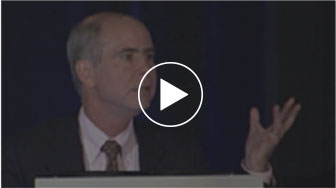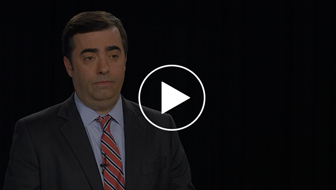Global Speakers
Watch educational videos exploring the rapidly evolving field of Immuno-Oncology

- Chapter 1: Introduction
- Chapter 2: Incidence and prevalence of brain tumors
- Chapter 3: Immune privilege in the brain, immunoediting, and immune evasion
- Chapter 4: Mechanisms of tumor immune escape in the tumor microenvironment in the brain
- Chapter 5: Closing remarks
Our evolving understanding of brain cancers is changing the way we look at the interaction between the immune system and the brain. In this talk, Dr. David Reardon presents an overview of the evolving research in harnessing the immune system to fight brain cancer, including a new realization of a dynamic interaction between the systemic immune response and immune responses in the central nervous system. Additionally, Dr. Reardon explains that there are various factors exploited by brain tumors that may pose challenges for the generation of an effective anti-tumor immune response.
Dr. David Reardon is a Professor of Medicine at Harvard Medical School and Clinical Director at the Center for Neuro-Oncology within Medical Oncology at the Dana-Farber Cancer Institute.

Our evolving understanding of brain cancers is changing the way we look at the interaction between the immune system and the brain. In this talk, Dr. David Reardon presents an overview of the evolving research in harnessing the immune system to fight brain cancer, including a new realization of a dynamic interaction between the systemic immune response and immune responses in the central nervous system. Additionally, Dr. Reardon explains that there are various factors exploited by brain tumors that may pose challenges for the generation of an effective anti-tumor immune response.
Dr. David Reardon is a Professor of Medicine at Harvard Medical School and Clinical Director at the Center for Neuro-Oncology within Medical Oncology at the Dana-Farber Cancer Institute.
- Chapter 1: Introduction
- Chapter 2: Overview of renal cell carcinoma
- Chapter 3: Current treatment modalities in renal cell carcinoma
- Chapter 4: Renal cell carcinoma and the immune system
- Chapter 5: Immuno-Oncology in renal cell carcinoma
- Chapter 6: Tumor escape from immune surveillance
- Chapter 7: Closing remarks
Renal cell carcinomas (RCC) are nimble, they mutate quickly, and patients ultimately progress. Delivering a long-term survival benefit for patients with advanced renal cell carcinoma remains a goal. In this video, Dr. Plimack discusses current research focused on reengaging the immune system in RCC, an immunogenic cancer.
Dr. Elizabeth Plimack is Director of Genitourinary Clinical Research and Associate Professor of Medical Oncology at Fox Chase Cancer Center in Philadelphia, PA.
-


- Chapter 1: Introduction
- Chapter 2: Overview of renal cell carcinoma
- Chapter 3: Current treatment modalities in renal cell carcinoma
- Chapter 4: Renal cell carcinoma and the immune system
- Chapter 5: Immuno-Oncology in renal cell carcinoma
- Chapter 6: Tumor escape from immune surveillance
- Chapter 7: Closing remarks
Immuno-Oncology in Renal Cell Carcinoma
- Chapter 1: Introduction
- Chapter 2: Immune responses to renal cell carcinoma
- Chapter 3: Mechanisms of tumor evasion
- Chapter 4: Checkpoint pathways as Immuno-Oncology targets
- Chapter 5: Closing remarks
In kidney cancer, tumors can inhibit the immune response through multiple mechanisms. In this video, Dr. McDermott provides a brief look into how better understanding immune pathways may provide insight on the mechanisms governing the interaction between kidney cancer and host immune responses.
Dr. David F. McDermott is Director of the Biologic Therapy Program at Beth Israel Deaconess Medical Center in Boston, MA, and leader of the Kidney Cancer Program at the Dana Farber Harvard Cancer Center, as well as an Associate Professor of Medicine at Harvard Medical School.
- Chapter 1: Overview of immune activity in the lungs
- Chapter 2: Immune cells in the lungs
- Chapter 3: The immune response in the lungs
- Chapter 4: Immunosurveillance in the lungs
- Chapter 5: Other strategies to escape immunosurveillance
- Chapter 6: Closing remarks
With every breath, our lungs make contact with the outside world—and all the pathogens it contains. As a result, a specialized group of immune cells have developed to fight infection within the lung. How those cells interact with lung tumors—and how the tumors fight back—is the focus of this talk with Dr. Karen Lynn Reckamp.
Karen Lynn Reckamp, MD, MS, is the Co-Chair of the Lung Cancer and Thoracic Oncology Program at City of Hope in Duarte, CA.
- Chapter 1: Introduction
- Chapter 2: Immune responses to renal cell carcinoma
- Chapter 3: Mechanisms of tumor evasion
- Chapter 4: Checkpoint pathways as Immuno-Oncology targets
- Chapter 5: Closing remarks
In kidney cancer, tumors can inhibit the immune response through multiple mechanisms. In this video, Dr. McDermott provides a brief look into how better understanding immune pathways may provide insight on the mechanisms governing the interaction between kidney cancer and host immune responses.
Dr. David F. McDermott is Director of the Biologic Therapy Program at Beth Israel Deaconess Medical Center in Boston, MA, and leader of the Kidney Cancer Program at the Dana Farber Harvard Cancer Center, as well as an Associate Professor of Medicine at Harvard Medical School.
- Chapter 1: Overview of immune activity in the lungs
- Chapter 2: Immune cells in the lungs
- Chapter 3: The immune response in the lungs
- Chapter 4: Immunosurveillance in the lungs
- Chapter 5: Other strategies to escape immunosurveillance
- Chapter 6: Closing remarks
With every breath, our lungs make contact with the outside world—and all the pathogens it contains. As a result, a specialized group of immune cells have developed to fight infection within the lung. How those cells interact with lung tumors—and how the tumors fight back—is the focus of this talk with Dr. Karen Lynn Reckamp.
Karen Lynn Reckamp, MD, MS, is the Co-Chair of the Lung Cancer and Thoracic Oncology Program at City of Hope in Duarte, CA.
- Chapter 1: Introduction
- Chapter 2: Lung cancer statistics
- Chapter 3: Overview of immunotherapies
- Chapter 4: Immunotherapies under investigation
- Chapter 5: Active research in the tumor microenvironment
- Chapter 6: Immune checkpoints
- Chapter 7: Closing remarks
Knowledge of immune interactions with cancer cells in the lung is driving new research into potential immune-based therapeutics. In this video, Dr. Jack West explores the current landscape of therapeutic approaches under investigation.
Howard L. (Jack) West, MD, is the Medical Director of the Thoracic Oncology Program at the Swedish Cancer Institute in Seattle, WA.
- Chapter 1: Introduction
- Chapter 2: The unmet need in multiple myeloma
- Chapter 3: Interactions among multiple myeloma cells, the immune system, and the bone marrow microenvironment
- Chapter 4: The role of the immune system in multiple myeloma
- Chapter 5: Introduction to Immuno-Oncology in multiple myeloma
- Chapter 6: Closing remarks
There is a large unmet need for medical advances in the treatment of multiple myeloma, or bone marrow cancer. In this video, Drs. Ken Anderson and Sagar Lonial discuss rapidly evolving research in the field of Immuno-Oncology in treating multiple myeloma by harnessing the body’s own natural defenses to fight cancer.
Dr. Ken Anderson is the Director of the Jerome Lipper Multiple Myeloma Center at the Dana Farber Cancer Institute in Boston, MA.
Dr. Sagar Lonial is a Professor and Vice Chair of the Clinical Affairs Department of Hematology and Medical Oncology at Emory University School of Medicine in Atlanta, GA.
-


- Chapter 1: Introduction
- Chapter 2: The unmet need in multiple myeloma
- Chapter 3: Interactions among multiple myeloma cells, the immune system, and the bone marrow microenvironment
- Chapter 4: The role of the immune system in multiple myeloma
- Chapter 5: Introduction to Immuno-Oncology in multiple myeloma
- Chapter 6: Closing remarks
Immuno-Oncology in Multiple Myeloma
- Chapter 1: Introduction
- Chapter 2: Overview of multiple myeloma
- Chapter 3: Cancer immunity cycle
- Chapter 4: Immune evasion and the bone marrow microenvironment in multiple myeloma
- Chapter 5: Immunotherapeutic strategies under investigation in multiple myeloma
- Chapter 6: Immuno-Oncology in multiple myeloma
- Chapter 7: Closing remarks
In multiple myeloma, or bone marrow cancer, myeloma cells thrive by interfering with the body’s natural immune surveillance system. In this video, Drs. Ken Anderson and Sagar Lonial discuss the current advances in Immuno-Oncology being used to harness the potential of the body’s own natural immunity against this disease.
Dr. Ken Anderson is the Director of the Jerome Lipper Multiple Myeloma Center at the Dana Farber Cancer Institute in Boston, MA.
Dr. Sagar Lonial is a Professor and Vice Chair of the Clinical Affairs Department of Hematology and Medical Oncology at Emory University School of Medicine in Atlanta, GA.
- Chapter 1: Introduction
- Chapter 2: Overview of melanoma landscape
- Chapter 3: Immune system’s role in melanoma
- Chapter 4: Mechanisms of tumor immune evasion
- Chapter 5: Exploitation of immune pathway mechanisms in melanoma
- Chapter 6: Immune checkpoint pathways
- Chapter 7: Immuno-Oncology research
- Chapter 8: Closing remarks
Melanoma cancer cells often have the ability to evade the body’s immune system by mimicking normal cells. In this video, Dr. Jedd Wolchok discusses current research in the field of Immuno-Oncology that supports the immune system in its fight to overcome melanoma’s defense mechanisms.
Dr. Jedd Wolchok is the Lloyd J. Old/Virginia and DK Ludwig Chair of Clinical Investigation and Chief of Melanoma and Immunotherapeutics Service at Memorial Sloan-Kettering Cancer Center in New York.
-


- Chapter 1: Introduction
- Chapter 2: Overview of multiple myeloma
- Chapter 3: Cancer immunity cycle
- Chapter 4: Immune evasion and the bone marrow microenvironment in multiple myeloma
- Chapter 5: Immunotherapeutic strategies under investigation in multiple myeloma
- Chapter 6: Immuno-Oncology in multiple myeloma
- Chapter 7: Closing remarks
Mechanism of Pathways in Multiple MyelomaIn multiple myeloma, or bone marrow cancer, myeloma cells thrive by interfering with the ...
In multiple myeloma, or bone marrow cancer, myeloma cells thrive by interfering with the body’s natural
-


- Chapter 1: Introduction
- Chapter 2: Overview of melanoma landscape
- Chapter 3: Immune system’s role in melanoma
- Chapter 4: Mechanisms of tumor immune evasion
- Chapter 5: Exploitation of immune pathway mechanisms in melanoma
- Chapter 6: Immune checkpoint pathways
- Chapter 7: Immuno-Oncology research
- Chapter 8: Closing remarks
A Closer Look at Mechanism of Pathways in Melanoma
- Chapter 1: Introduction
- Chapter 2: Transforming our understanding of metastatic melanoma
- Chapter 3: The emerging modality of Immuno-Oncology
- Chapter 4: Melanoma and the immune system
- Chapter 5: Tumor immune evasion
- Chapter 6: Closing remarks
Metastatic melanoma, as an immunogenic cancer, is often associated with inducing an immune response in patients. In this video, Dr. Sanjiv Agarwala gives a brief history of Immuno-Oncology and how the immune system works to fight melanoma.
Dr. Sanjiv Agarwala is Professor of Medicine at Temple University School of Medicine in Philadelphia, Pennsylvania and Chief of Medical Oncology and Hematology at St. Luke’s Cancer Center in Bethlehem, Pennsylvania.










